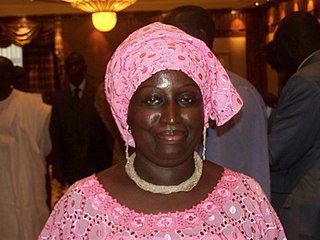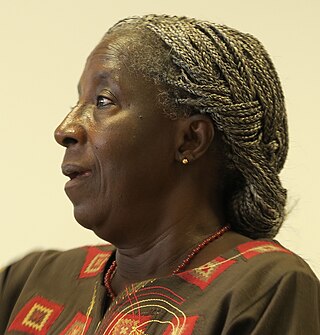
Françoise d'Eaubonne was a French author, labour rights activist, environmentalist, and feminist. Her 1974 book, Le Féminisme ou la Mort, introduced the term ecofeminism. She co-founded the Front homosexuel d'action révolutionnaire, a homosexual revolutionary alliance in Paris.

Mariama Bâ was a Senegalese author and feminist, whose two French-language novels were both translated into more than a dozen languages. Born in Dakar, Senegal, she was raised a Muslim.

Senegal elects on the national level a head of state – the president – and a legislature. The president is elected for a seven-year term by the people.

Aminata Sow Fall is a Senegalese-born author. While her native language is Wolof, her books are written in French. She is considered "the first published woman novelist from francophone Black Africa".

Amadou Lamine-Guèye was a Senegalese politician who became leader of the Parti Sénégalais de l'Action Socialiste. In 1945 he and his associate, Léopold Sédar Senghor, were elected to represent Senegal in the French National Assembly. Gueye was also elected to the French Senate in 1958.

Senegalese literature is written or literary work which has been produced by writers born in the West African state. Senegalese literary works are mostly written in French, the language of the colonial administration. However, there are many instances of works being written in Arabic and the native languages of Wolof, Pulaar, Mandinka, Diola, Soninke and Serer. Oral traditions, in the form of Griot storytellers, constitute a historical element of the Senegalese canon and have persisted as cultural custodians throughout the nation's history. A form of proto-Senegalese literature arose during the mid 19th century with the works of David Abbé Boilat, who produced written ethnographic literature which supported French Colonial rule. This genre of Senegalese literature continued to expand during the 1920s with the works of Bakary Diallo and Ahmadou Mapaté Diagne. Earlier literary examples exist in the form of Qur’anic texts which led to the growth of a form African linguistic expressionism using the Arabic alphabet, known as Ajami. Poets of this genre include Ahmad Ayan Sih and Dhu al-nun.

Women in Senegal have a traditional social status as shaped by local custom and religion. According to 2005 survey, the female genital mutilation prevalence rate stands at 28% of all women in Senegal aged between 15 and 49.

Penda Mbow, born in 1955, is a historian, an activist, and a Senegalese politician. Minister of Culture of Senegal for several months in 2001, she is a professor at Université Cheikh Anta Diop in Dakar and president of Mouvement citoyen.

The Henriette-Bathily Women's Museum is a museum which was located on Gorée, an island on the coast of Senegal, across from the House of Slaves museum. In May 2015, it moved to Dakar, at the Place du Souvenir Africain et de la Diaspora . A project conceived in 1987 by the filmmaker Ousmane William Mbaye, it was opened in 1994 under the direction of Annette Mbaye d'Erneville.

Parliamentary elections were held in Senegal on 1 July 2012 to elect the 150 members of the National Assembly. The result was a landslide victory for the United in Hope coalition supporting newly elected President Macky Sall, which won 119 of the 150 seats in the National Assembly. Voter turnout in the election was just 37%.

The National Order of the Lion is the highest order of Senegal.

Association Sportive des Douanes, commonly known as AS Douanes, is a Senegalese basketball club from Dakar. Part of the Senegalese national customs agency, the team plays in the national top division Nationale 1 (NM1) and in the Basketball Africa League (BAL).
Ndèye Fatou Kane is a Senegalese novelist and feminist.

Fatou Sow is a Senegalese feminist sociologist specialising in sociology of gender.

Codou Bop is a Senegalese sociologist, journalist and women's rights activist who also engages against gender violence in Sub-Saharan Africa.
Kalista Sy is a Senegalese screenwriter known for writing and producing the TV series Mistress of a Married Man. The series is set in Dakar and premiered on Marodi TV Sénégal in January 2019.

Parliamentary elections were held in Senegal on 31 July 2022 to elect the 165 members of the National Assembly. President Macky Sall's United in Hope coalition remained the largest bloc in the National Assembly but lost its majority it had held since 2012.

Collectif Némésis is an organisation in France and Switzerland for women aged 18 to 30, describing itself as feminist and identitarian. The organisation is named after Nemesis, the Greek goddess of revenge, and was founded by Alice Cordier in 2019. The organisation believes in a connection between immigration and crime, namely that non-European immigrants, particularly Muslims, present an elevated risk of violence towards women. The organisation has been condemned as racist by mainstream feminist organisations.
In Senegal, abortion is illegal unless the life of the mother is in danger. A medical exception requires a medical certificate. Senegal is one of the only countries whose criminal code completely bans abortion. Receiving an abortion is punishable by fines and prison. Abortion was banned in the colonial era. In 1967, an exception was made in the case of threat to life. In 2005, the National Assembly declared that women have a right to post-abortion care. Activists wanted this law to legalize abortion in the cases of rape or incest, but failed. In 2013, a group of NGOs called the Task Force formed with the goal of aligning Senegal's abortion law with the Maputo Protocol, which it had signed in 2004. The National Assembly considered a bill in 2024 that would guarantee legal access to medical abortion. International organizations have called for abortion law reform. Domestically, religious families and organizations influence widespread opposition to abortion due to Islamic beliefs.














